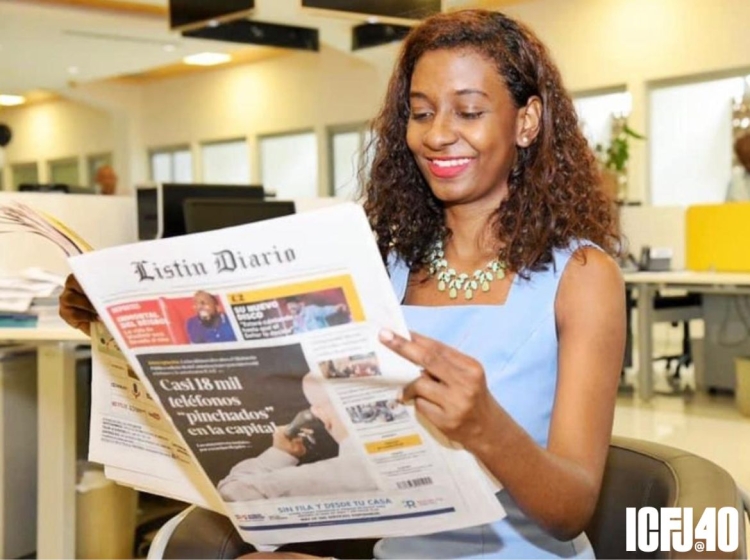Carolina Pichardo Hernández is an investigative editor at Listín Diario, a general news website that covers the Dominican Republic, where Pichardo is based.
Pichardo says that taking part in the ICFJ Emerging Media Leaders program “significantly advanced her career.” She notes that her newsroom placement “opened doors for me to join the Washington Post Talent Network, where I now collaborate on topics from sports to migration in the Dominican Republic.”
This interview has been edited slightly.

How have you been involved with ICFJ over the years?
In spring 2022, I had the opportunity to be part of the Emerging Media Leaders (EML) program, becoming the first Dominican selected for this project. During the first week, fellows from Costa Rica, Brazil, Colombia, Ecuador, Saint Kitts & Nevis, Mexico, Argentina and the Dominican Republic participated in an orientation week with experts in journalism and communications.
As part of this fellowship, I was placed for four weeks at USA Today, covering Congress, politics and the White House. During my placement, I published articles such as “'Deadly risks': Migrants use TikTok to share journey to southern border. But smugglers use it too,” (Spanish version here). Another notable piece was “Congress has raised the debt ceiling at least 100 times – under Democratic and Republican presidents.” My time there also allowed me to attend White House press conferences, visit Congressman Adriano Espaillat’s office, and tour Capitol Hill and the Pentagon.
What was the biggest outcome from participating in the program?
Participating in the EML program significantly advanced my career. It was my first experience working with English-speaking reporters and publishing in English. The highlight of my placement was publishing the migrants and smugglers story on USA Today’s Frontline. This achievement opened doors for me to join The Washington Post Talent Network, where I now collaborate on topics from sports to migration in the Dominican Republic.
What is something impactful you have worked on since participating in an ICFJ program that you are proud of and would want to highlight?
After being selected as an EML fellow, I’ve focused more on climate change and climate justice. I’ve collaborated more with English-language media outlets and organizations, and for two consecutive years, I’ve served as a judge for the National Environmental Journalism Prize.
Additionally, I was chosen as a Caribbean Climate Justice Journalism Fellow for Climate Tracker, which has provided me with greater perspective and guidance on environmental issues. Thanks to this experience, I was recently awarded the 2024 Alumni Engagement Grant for the Emerging Media Leaders Program. This grant will be used to develop a digital news outlet focusing on environmental stories in the Dominican Republic and the region.
Why is it so important right now to provide the kind of support to journalists that ICFJ does, especially in Latin America?
It’s crucial to support journalists in Latin America because there aren’t enough opportunities for training and mentorship in the region. These fellowships provide a unique cultural experience, access to experts in the media industry, placements in major U.S. media outlets and tools for learning and sharing knowledge with colleagues back home. This support can inspire journalists to create their own projects and platforms, becoming leaders in the field.
What are you currently working on that you’re excited about?
I’m excited about a project I’m working on in collaboration with ICFJ, funded by an EML program grant, to develop an innovative environmental project in the Dominican Republic. This project will promote climate and environmental news. I am currently receiving guidance from an ICFJ mentor and learning a lot about media management.
Why did you choose to become a journalist?
I became a journalist to honor what my father taught me as a child. I remember being surrounded by newspapers and learning to read and write with news articles, thanks to my dad’s guidance during our free time. In the future, that was the career I was more drawn to, and I am really proud to have studied this, since it has opened doors and given me the chance to work on award-winning national and transnational investigations.
What’s one piece of advice you’d give to an aspiring journalist?
Don’t give up. Be confident in your work, read a lot, be open to learning from everyone in the industry and always help others grow as reporters.
Is there anything you would like to add?
I am deeply grateful to institutions like ICFJ. I will forever appreciate the incredible opportunities I’ve had over the past two years, from learning about digital tools for investigative journalism in Trinidad and Tobago to working with some of the most prestigious newspapers in the U.S. This experience has allowed me to connect with reporters who cover the White House, Congress and other key sources, and I now have access to valuable advice. With this opportunity, I’m confident I’ll be able to apply the knowledge I’ve gained and further develop a project that will allow me to advance as a reporter.